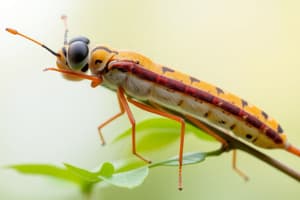Podcast
Questions and Answers
Who developed the first system of classification?
Who developed the first system of classification?
Aristotle
Who designed a system of classifying organisms based on their physical and structural similarities?
Who designed a system of classifying organisms based on their physical and structural similarities?
Carolus Linnaeus
What does the term 'genus' refer to in classification?
What does the term 'genus' refer to in classification?
A group of similar species
What is classification in biological context?
What is classification in biological context?
What is Binomial Nomenclature?
What is Binomial Nomenclature?
The scientific name of a species consists of a family name and a descriptive name.
The scientific name of a species consists of a family name and a descriptive name.
The scientific name of modern humans is Homo Sapiens.
The scientific name of modern humans is Homo Sapiens.
Latin is the language of scientific names.
Latin is the language of scientific names.
The scientific name of organisms can be misleading.
The scientific name of organisms can be misleading.
Taxonomies try to identify the evolutionary relationships among organisms.
Taxonomies try to identify the evolutionary relationships among organisms.
Besides comparing the structures of organisms, taxonomists also compare the organisms' geographic distribution and chemical makeup.
Besides comparing the structures of organisms, taxonomists also compare the organisms' geographic distribution and chemical makeup.
Similarities between living species and extinct species cannot be used to determine their relationship to each other.
Similarities between living species and extinct species cannot be used to determine their relationship to each other.
Classification can be useful in identifying the characteristics of an unknown organism.
Classification can be useful in identifying the characteristics of an unknown organism.
Which taxon includes the most specific characteristics?
Which taxon includes the most specific characteristics?
Which taxon includes the broadest characteristics?
Which taxon includes the broadest characteristics?
Which taxon includes more species; an order or a family?
Which taxon includes more species; an order or a family?
Which taxon includes only organisms that can successfully interbreed?
Which taxon includes only organisms that can successfully interbreed?
If two organisms belong to the same family, what other taxonomic groups do they have in common?
If two organisms belong to the same family, what other taxonomic groups do they have in common?
Which two of the following organisms are most closely related: Green frog, Mountain Lion, Domestic Dog, Human?
Which two of the following organisms are most closely related: Green frog, Mountain Lion, Domestic Dog, Human?
To which taxa do all four of the following organisms belong: Green frog, Mountain Lion, Domestic Dog, Human?
To which taxa do all four of the following organisms belong: Green frog, Mountain Lion, Domestic Dog, Human?
Which class does not include animals that have hair or fur?
Which class does not include animals that have hair or fur?
What is the order of a human?
What is the order of a human?
What is the family of a human?
What is the family of a human?
What is the genus of a human?
What is the genus of a human?
Study Notes
Classification Overview
- Aristotle developed the first system of classification for living organisms.
- Carolus Linnaeus created a hierarchical system based on physical and structural similarities among organisms.
Taxonomic Hierarchy
- Genus: A classification that groups similar species.
- Species: Contains the most specific characteristics; only organisms that can interbreed successfully belong to the same species.
- Kingdom: Represents the broadest category in taxonomy.
- Order: Comprises more species than a family; for example, the order Carnivora includes mountain lions and domestic dogs.
Naming Conventions
- Classification: The process of grouping objects or information by similarities.
- Binomial Nomenclature: A two-word naming system for organisms, emphasizing consistency in scientific naming.
- Latin serves as the language for scientific names to provide universal understanding.
Scientific Names and Terminology
- The scientific name for humans is Homo sapiens.
- Common names can be misleading; scientific names clarify relationships and characteristics.
- Taxonomy involves assessing similarities across living and extinct species to uncover evolutionary relationships.
Comparison Criteria in Taxonomy
- Taxonomists examine not only the physical structures but also geographical distribution and chemical makeup to classify organisms accurately.
- Organisms belonging to the same family share common taxonomic groups: order, class, phylum, and kingdom.
Quiz Statements
- Taxonomic assertions were tested, revealing that:
- Scientific names consist of a genus and a species descriptor.
- Similarities between living and extinct species can reveal evolutionary connections.
- Classification is instrumental in identifying characteristics of unknown organisms.
Organism Relationships
- Mountain lions and domestic dogs are closely related, sharing the same order (Carnivora).
- All listed organisms belong to the same kingdom and phylum.
- The class "Amphibia" does not include animals with hair or fur.
Taxonomic Information for Humans
- Order: Primates
- Family: Hominidae
- Genus: Homo
Studying That Suits You
Use AI to generate personalized quizzes and flashcards to suit your learning preferences.
Description
Test your knowledge on the key concepts of classification from Chapter 17 of your biology textbook. This quiz covers important figures like Aristotle and Carolus Linnaeus, as well as fundamental terms like genus and classification. Use these flashcards to understand how life's diversity is organized.




